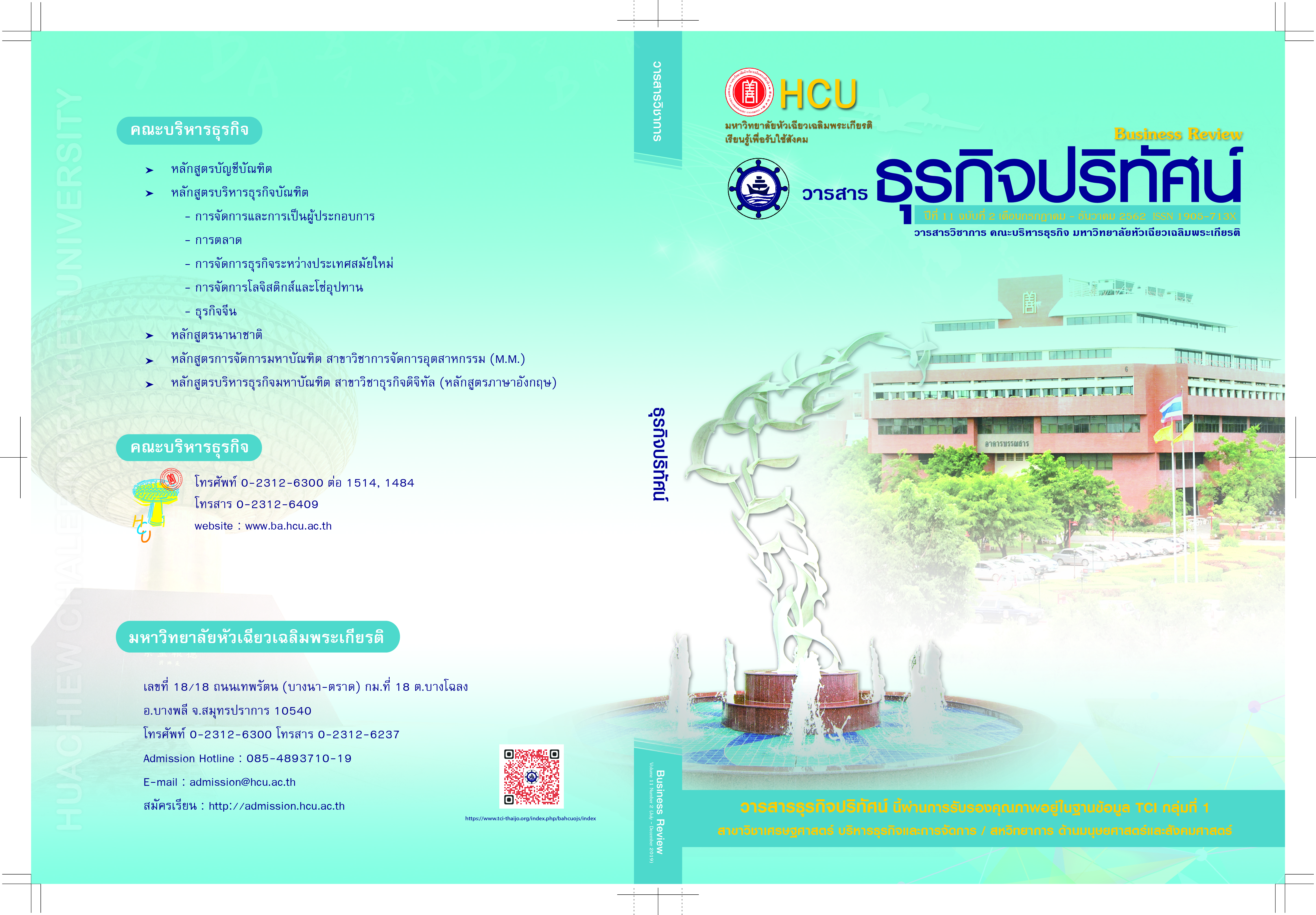Risk Perception of Generation Z Tourists on Hotel and Accommodation Reservation through the Internet
Keywords:
Risk Perception, Generation Z, Hotel and Accommodation Reservation, InternetAbstract
The purposes of this study were to compare sex and domicile in terms of the risk
perception on hotel and accommodation reservation through the internet. The samples were
385 Generation Z tourists. A questionnaire was used as a survey tool and data were analyzed
statistically using the percentage, means, standard deviation, and the test value “t” (t-test) in
order to compare risk perception between male and female. One-way analysis of variance:
ANOVA was used to compare risk perception among respondents by their domicile. If the
results had been significantly different at the level 0.05 then the LSD Method would have
been employed. The results were as followed that the most significant risk perception which
affected Generation Z tourists’ hotel and accommodation reservation through the internet was
Product and service error ( –х = 3.99, S.D. = 0.81). Comparison risk perception of Generation
Z tourists’ hotel and accommodation reservation through the internet by sex and domicile, there
were no significant difference at 0.05 levels.
References
เศรษฐศาสตรมหาบัณฑิต, มหาวิทยาลัยศรีนครินทรวิโรฒ.
ธัญมาศ ทองมูลเล็ก และปรีชา วิจิตรธรรมรส. (2560). การศึกษาปัจจัยที่มีผลต่อการยอมรับและการใช้งาน
เครือข่ายสังคมออนไลน์ในสังคมไทย. วารสารวิชาการนวัตกรรมสื่อสารสังคม, 2(10), 114-124.
พัฐรัศมิ์ ว่องไชยกุล. (2560). Expedia เปิดข้อมูลวิจัยพฤติกรรมนักท่องเที่ยวยุโรป 4 เจนเนอเรชัน แนะ
โรงแรมไทยปรับตัว. สืบค้นเมื่อ 9 ธันวาคม 2561, จาก นิตยสารฟอร์บส ไทยแลนด์ เว็บไซต์:
http://www.forbesthailand.com/news-detail.php?did=2092.
วรินทร์ทิพย์ ก?ำลังแพทย์. (2559). การตลาดออนไลน์กับผู้บริโภคยุค XYZ. วารสารวิชาการและวิจัย มทร.
พระนคร สาขามนุษยศาสตร์และสังคมศาสตร์, 1(2), 1-17.
วันรบ บุญธรรม. (2554). NewBiES 8 กลุ่มชื้อโหม่ผลิกโลมหน้าการตลาดไทย. กรุงเทพฯ: กรุงเทพธุรกิจ.
วิมลรัตน์ เทียนวรรณ วรางคณา อดิศรประเสริฐ และศุภิณญา ญาณสมบูรณ์. (2553). ผลกระทบจาก
การเปิดซูเปอร์เซ็นเตอร์ที่มีต่อร้านค้าปลีกขนาดเล็กในจังหวัดบุรีรัมย์. วารสารศรีนครินทรวิโรฒ
วิจัยและพัฒนา (สาขามนุษยศาสตร์และสังคมศาสตร์), 2(4), 88-99.
ศูนย์วิจัยกสิกรไทย. (2561).โรงแรมแข่งดุเดือด ปรับได้ไปรอด. กรุงเทพฯ: ศูนย์วิจัยกสิกรไทย.
อรุณี อินทรไพโรจน์. (2560). ธุรกิจท่องเที่ยวออนไลน์ (e-Tourism). สืบค้นเมื่อ 9 ธันวาคม 2561, จาก
บล็อคเพื่อการจัดการคสามรู้ มทร.ธัญบุรี เว็บไซต์: http://www.blog.rmutt.ac.th/?p=76.
อตุลย์ จาตุรงคกุล. (2543). พฤติกรรมผู้บริโภค. กรุงเทพฯ: มหาวิทยาลัยธรรมศาสตร์.
Nattaya-an. (2554). สื่อ Internet กับการท่องเที่ยว. สืบค้นเมื่อ 11 ธันวาคม 2561, จาก oknation เว็บไซต์:
http://oknation.nationtv.tv/blog/nattaya-an/2011/08/04/entry-1
Cochran, W. G. (1977). Sampling techniques (3rd ed.). New York: John Wiley & Sons.
Cronbach, L. J. (1990). Essentials of psychology testing (5th ed.). New York: Harper Collins.
Kotler, P., &. Armstrong, G. (2003). Marketing and introduction. (6th ed.). New Jersey: Pearson.
Lim, N. (2003). Consumer perceived risk: Sources versus consequences. Electronic Consumer Research
and Applications, 2(3), 216-228.
Downloads
Published
How to Cite
Issue
Section
License
All articles published in the Business Administration and Management Journal Review are copyrighted by the journal.
The views and opinions expressed in each article are solely those of the individual authors and do not represent those of Huachiew Chalermprakiet University or any other faculty members. Each author is fully responsible for the content of their own article. Any errors or issues found are the sole responsibility of the respective author.




